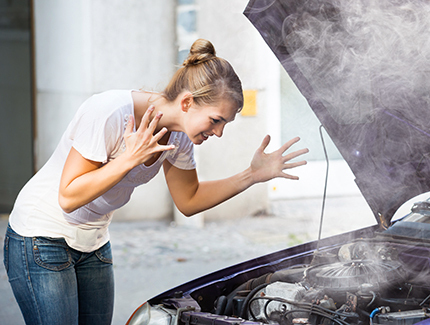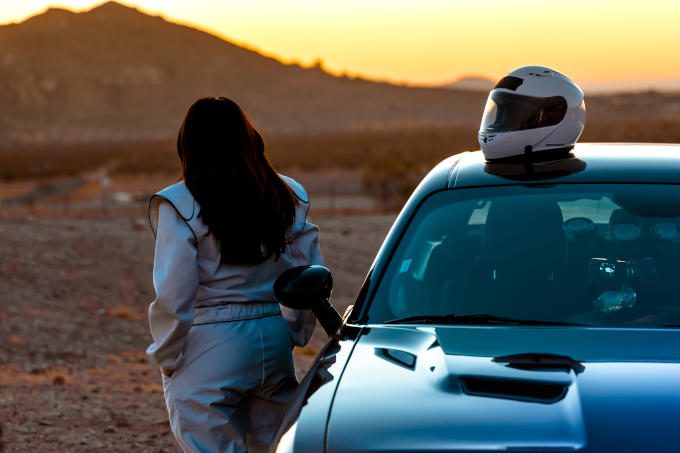Why Do Cars Overheat?
Cars can overheat for many reasons, but it usually deals with a malfunction of the cooling system. When heat can't be controlled, the engine temperature begins to rise above the optimum operating temperature. Most cars cooling systems run between 195-220 degrees Fahrenheit. When a car's coolant reaches 230 degrees Fahrenheit and above, it's overheating. As the temperature rises, the potential for severe and permanent damage to the engine and other components also increases.
Here are some classic warning signs that your car is overheating:
- Your temperature gauge edges past the normal limit into the H or red zone. Warnings may light up on your dashboard, or an alert may sound.
- You begin smelling a strange smell (sweet or burnt) from the engine.
- Perhaps most obvious and alarming is when steam starts coming from the engine compartment.
Continuing to drive your car when it's overheating can have catastrophic consequences for your engine and your safety. A warped cylinder head, blown gasket, and a seized engine are among the most serious and costly consequences of an overheated engine.
Here's What to Do if Your Car Overheats:
- If your air conditioner is on, turn it off, and then turn the heat on high.
This may sound counterintuitive, but your air conditioner puts a heavy load on your engine. Putting the heat on pulls excess heat from the engine into the car. Blasting the heat won't necessarily stop your vehicle from overheating, but it could help slow the engine from overheating.
- Stay calm, turn your hazard lights on, and get your car off the road as soon as safety allows.
Panic can cause an accident and create an even bigger emergency. If you're on a highway, getting off at the nearest exit or rest area is ideal, but only if it's extremely close (less than a quarter of a mile). If you do need to pull over on the side of the road, make a smooth exit and park the car at the farthest edge of the shoulder.
- Turn off the engine and keep your hazard lights on.
If it's dark, turn on your interior dome light too. Making sure other drivers see your car is a critical step in preventing another driver from hitting you.
- Stay in your car.
Never attempt to cross a highway. Don’t try to flag down passing vehicles. Just stay put. Lock your doors and keep your seatbelt fastened. If you have passengers, especially children, make sure they’re secure in their seats with their belts fastened until help arrives. If you do need to leave the car to get something, such as food and water from your roadside emergency kit, use caution.
- Make some phone calls.
If you're in a place or situation where you don't feel safe, trust your gut and call 911. If you have roadside assistance, call them first. Next, contact friends or family to tell them what's going on and where you are.
When it comes to safety, these are the simplest and best steps to help keep you and everyone around you, including passengers and other drivers, safe during a roadside emergency.
How Can I Prevent an Overheated Car?
Be Consistent
Regular maintenance of your vehicle is one of the best means of preventing any breakdown. Take your car into a mechanic before any road trips and especially before the start of summer and winter.
Be Aware
Getting into the habit of glancing at the temperature gauge periodically can catch a car that's beginning to overheat from actually overheating. Additionally, keep a lookout for any liquid coming out from under your car — this can indicate a coolant or oil leak. Low or leaking coolant is one of the main reasons cars overheat.
Be Prepared
Have a roadside emergency kit (which can be assembled or bought) and be sure your phone is charged before getting on the road. These two things can help with stress in the event of a breakdown. Your roadside emergency kit should always include non-perishable food items, water, reflective triangles, a flashlight, extra clothing and blankets, heavy utility gloves, and an extra bottle of coolant. Having roadside assistance is also helpful because it’s available 24/7 and connects you with local help immediately, decreasing wait time and therefore increasing safety.
Be Educated
Cars aren't unknowable creatures that only a mechanic truly understands. Be proactive about getting to know your vehicle. Read the owner's manual, and ask your mechanic or car knowledgeable friend to show you around under the hood. Being able to check essential fluids, such as your car's oil, and coolant, can go a long way when it comes to keeping you on the road.
AAMCO has more than 60 years of experience servicing and repairing transmissions and has worked on more than 20 million vehicles. Customers rely on us for:
- Quality workmanship
- Superior service
- Best warranty coverage available
- Trustworthy, honest service
AAMCO Centers of Southern California and surrounding areas represent trust, quality, and value.

 Schedule Appointment
Schedule Appointment















